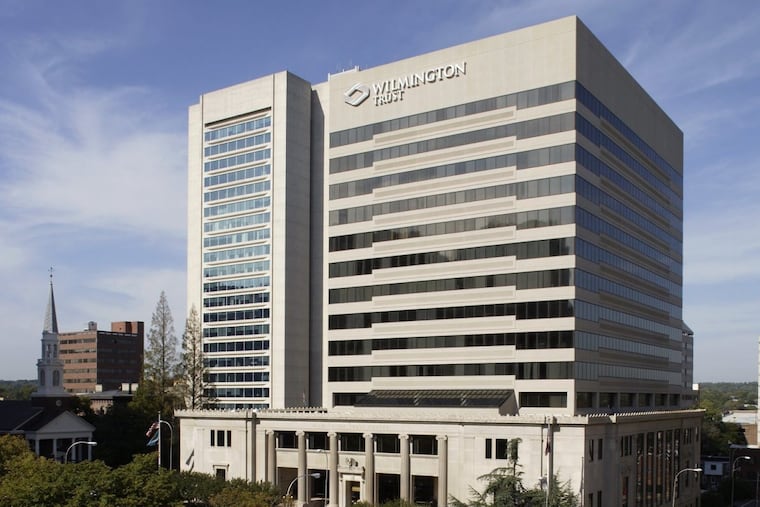Years after crisis, bankers head to trial
Four executives of the former Wilmington Trust Corp. are scheduled for trial in October on fraud and related charges.

Penn's Wharton School last week marked the 10th anniversary of the bad-home-loan finance scandals that started the last financial crisis, asking, among other questions, Why did so few erring bankers go to prison?
"The costs of pursuing a prosecution are so heavy," finance professor Richard Herring said in Knowledge@Wharton. "The expedient course of action is to reach an agreement in which the corporation does not admit having violated the rule but still pays a substantial penalty." Of course, this "leaves the public with the impression that justice has not been served."
If "justice" means some of the bankers whose institutions collapsed — destroying jobs and equity, requiring government help — go to prison, one place it may yet be served is Delaware, where four executives of the former Wilmington Trust Corp. are scheduled for trial in October on fraud and related charges.
The bankers are accused of fraudulently hiding billions in bad loans to shore developers and other risky businesses, from investors, regulators, and the public, while raising private and government capital. This was done in violation of bank, national, and industry standards, and despite repeat warnings from outside auditors at KPMG, bank examiners from the Federal Reserve Bank of Philadelphia, and the woman who headed the bank's own credit review department. The bank belatedly admitted billions in bad loans, forcing its sale to M&T Bank in 2010 at a fraction of its former value.
Internal documents posted by prosecutors last month list warnings given to bank leaders such as former president Robert Harra, who is among those indicted, and CEO Ted Cecala, who has not been indicted. Kim Reeves, spokesman for the U.S. Attorney's Office in Wilmington, says "the investigation is continuing."
Prosecutors say the bank's bosses lent generously in an effort to "control the market" at the Delaware Shore and the hot housing market near Middletown. The bank's outside auditors, from KPMG, warned in 2009 that bank loan controls "were not designed effectively." Bank reports quote federal examiners complaining that the bank's bonus pay program discouraged "proper behavior," and loan officers had "too much influence" on approvals. Examiners were "very surprised" the bank failed to respect industry loan norms; its focus on potential deal profitability, not payback risks, "makes no sense."
Emails between Karen Thuresson, head of the bank's loan review group, and her bosses and subordinates, state risks frankly: "The horse is not only out of the barn, but running down the road," vice president Martin Infanti told her in May 2009 about an overlarge loan to a project that hadn't been approved by local officials.
"I'm beginning to have difficulty quashing concerns about the integrity of our lending process," Thuresson wrote to her bosses. She characterized pushback from when she brought shaky loans to the attention of top executives: "You must be nuts," they told her. She warned that the bank's own calculations showed loose credit had financed an estimated 14 years' worth of unsold homes and projects around the Delaware Shore.
The government also presented the draft of a 2010 performance review of Harra, written in the voice of the bank's last CEO, Donald Foley, who replaced Cecala after the bank's belated admissions: "I must attribute the inadequate response at Wilmington Trust to you," it reads. Lending on his watch was "inconsistent with prudent professional practice and industry standards." Harra resisted needed change: "When I became CEO in June, I found that during the first half of the year you had abdicated leadership for the business, leaving it floundering."
Harra's lawyer, Andrew Lawler, said the draft "has absolutely no relevance" to the charges. "The so-called performance review was an email drafted by a subordinate employee who was not responsible for supervising Mr. Harra. It was never finalized and never shared with Mr. Harra," he told me.
The government also posted an adaptation of the court scene from the film A Few Good Men, which Brian Bailey, a former Wilmington Trust officer who pleaded guilty to loan fraud after the bank's collapse, sent in happier times to former chief financial officer David Gibson, one of the fraud defendants. Bailey planned it for a bank cocktail party. He was to play a banker version of the self-justifying, rogue Marine colonel played by Jack Nicholson, along with a "KPMG Auditor" pushing questions as if he were Tom Cruise's military prosecutor:
Bailey: "Have you ever made a loan, son?"
Auditor: "No, sir."
Bailey: "Ever have to figure out how to finance a project at 100 percent (loan-to-value ratio) with a nonsensical appraisal? We make loans, son. We make loans, or clients can't live their lavish lifestyles beyond their means. It's that simple …"
Auditor: "I want the truth."
Bailey: "You can't handle the truth! Son, we live in a world where unreasonable clients need 100 percent financing for real estate deals, and those deals need to be approved by lenders with approval authority. Who's going to do it? … You have the luxury of not knowing what I know: That these loans, while substandard, probably created obscene wealth. And my existence, while grotesque and incomprehensible to you, creates that wealth … You want me to make these loans."
Shouting, he admits what he's done.
Parody, or confession?